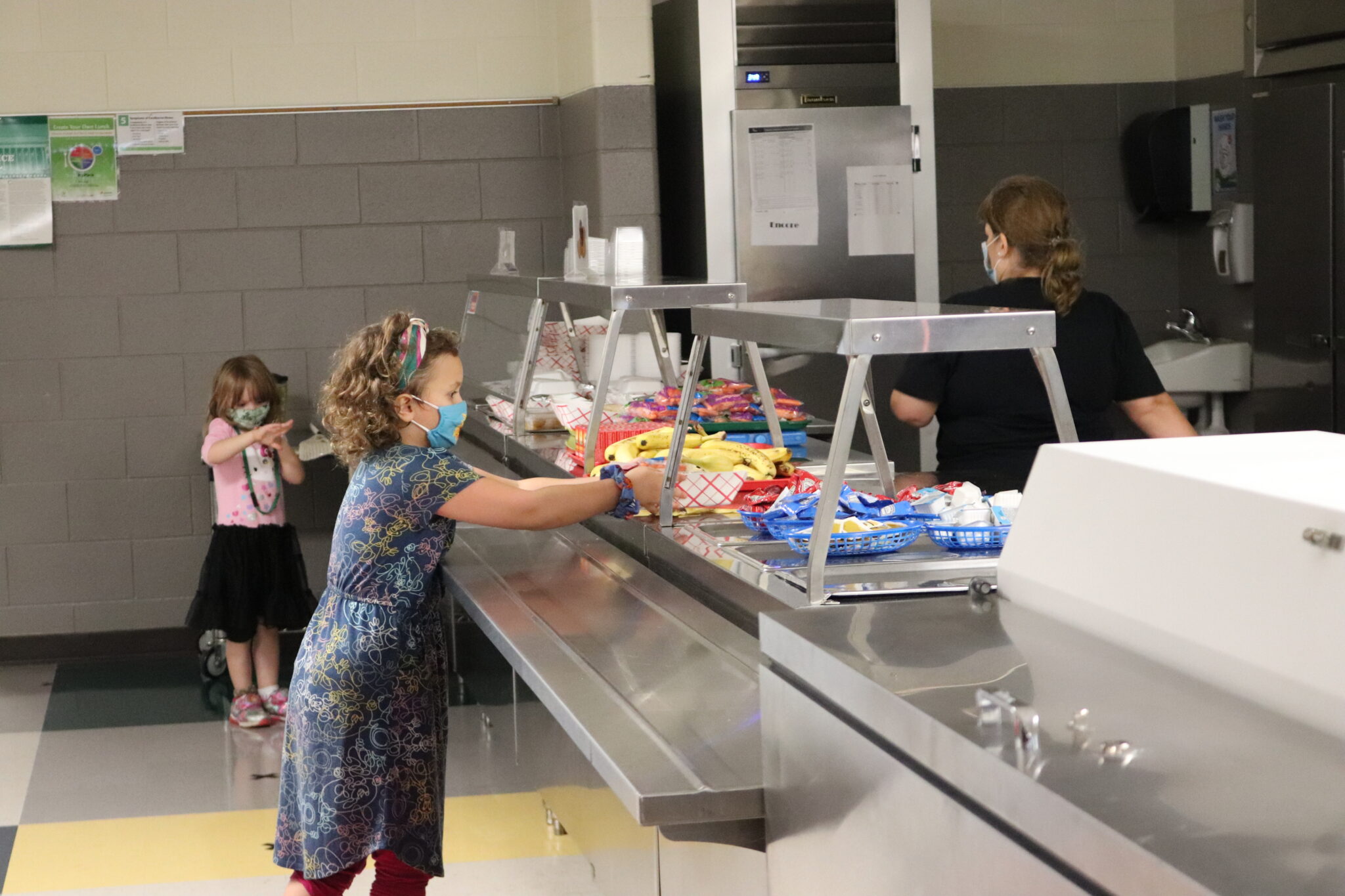‘A nightmare’: Missouri schools adapt as labor shortages upend school meal supply chain

Shawndra Taylor had just 12 hours notice when the first truck canceled.
In it, contained food to help prepare the 3,000 meals served each day in her school district in Eldon — including items she needed to make dinner for students. Her supplier, Kohl Wholesale in Quincy, Ill., was too short-staffed.
Taylor, the district’s food services director, had to quickly pull together a contingency plan. She even offered to rent a refrigerated truck and have her husband drive it the 300 miles round trip from central Missouri to the company’s Illinois warehouse.
But Taylor said she was told the company didn’t have enough employees to pull her order.
“It’s just been kind of a nightmare,” Taylor said, later adding: “I’ve never not had a truck show up because they legit don’t have anybody to pick the orders in the warehouse, and they don’t have anybody to drive a truck.”
It’s a labor shortage that has affected schools nationwide, with manufacturers, suppliers and schools themselves feeling the strain of a dearth of employees.
“It’s just all along the chain, there’s a lack of employees at every step of the way,” said Carmen Fischer, the director of child nutrition services and warehouse for the Rockwood School District in St. Louis County.
Schools across Missouri have faced delayed shipments of ingredients for meals, and in some cases they’ve had their contracts canceled altogether. Even getting paper plates has been a challenge.
As a result, schools have been left scrambling to secure other suppliers. In some instances, they’ve had to get creative and source food from grocery stores or big-box retailers, like Sam’s Club.
Using the Missouri National Guard was even floated as one option to temporarily staff shortages — a solution that was ultimately not feasible because shortages were occurring within private businesses, said Mallory McGowin, a spokeswoman for the Missouri Department of Elementary and Secondary Education.
In recent weeks many districts have sent notices home to families to let them know lunch menus may look different than what was planned as they adapt. Liberty Public Schools asked families to send students with meals from home in the short-term if it’s not a burden. As North Kansas City Schools said in a letter to families earlier this month, “substitutions will be the norm.”
The Department of Elementary and Secondary Education is working to assess the issue and facilitate coordination among districts to increase purchasing power. The shortages also raised concerns for a bipartisan group of five state senators, who in a letter to Gov. Mike Parson last week drew attention to the issue.
“With Missouri’s record budget surplus, millions in federal COVID-relief funds in our coffers, and one of the best workforces in the nation — surely there is something our state can do to care for our own,” read the letter signed by Republican Sen. Cindy O’Laughlin and Democratic Sens. Lauren Arthur, John Rizzo, Greg Razer and Jill Schupp.
A spokeswoman for the governor did not immediately respond to a request for comment Monday.
‘Going into crisis mode’
When Taylor got the news that her delivery from Kohl Wholesale would be cancelled during the first week of school, she called Graves Foods, a wholesale grocer in Jefferson City, and explained her predicament. A salesman jumped in his car to drive items down to Eldon that same day, Taylor said. A truck with more supplies arrived the following day.
“It was a lifesaver,” Taylor said.
Taylor said she was warned by Kohl Wholesale that going into this school year districts should expect uncertainty. Unlike others, her district’s contract with the supplier hasn’t ended, although she has faced multiple cancellations of deliveries. She doesn’t blame them.
“They’re just trying to keep themselves afloat,” Taylor said. “Nobody wants to make that phone call though, that they’re having to cancel a food truck for a school to feed students.”
But it leaves schools in a hard position, “because at the end of the day, it doesn’t matter,” Taylor said. “We still have to feed kids.”
In an email shared with state lawmakers earlier this month and obtained by The Independent, Jenna Knuth, the director of food and nutrition services for North Kansas City Schools described losing three of the district’s vendors.
When Sysco dropped the district the week before school started, “they were the second domino to fall” Knuth wrote. “We knew then, that the K12 supply chain/industry was going into crisis mode.”
“We have struggled to procure the foods that they aren’t bringing in, as none of our other distributors could take on more volume,” Knuth went on to write.
Representatives for Kohl Wholesale and Sysco did not respond to requests for comment last week. Sara Matheu, a spokeswoman for US Foods, said the company has not cancelled any contracts with school districts in Kansas City, but did decide to not renew contracts or participate in bid requests “with a limited number of districts within their normal bid cycle and the reasons vary based on the individual customer.”
Knuth wrote that the district has resorted to buying pallets of food from Sam’s Club, Restaurant Depot and local meat producers as the district attempts to establish contracts with other distributors.
At the Rockwood School District, Fischer hasn’t been able to find pretzel rolls to make cheese pretzel sandwiches since late last year. She’s faced cancelled deliveries from Kohl Wholesale as well since the start of the school year, and any given week faces the uncertainty of whether an order will come.
“The menus are simpler this year for sure,” said Fischer, whose department serves roughly 14,000 students a day.
The U.S. Department of Agriculture (USDA) has extended waivers that allow districts to deviate from certain nutrition requirements, like that low-fat milk must be unflavored. Districts are permitted to make emergency, no-bid procurements, including to negotiate new one-year contracts. And earlier this month, the USDA waived financial penalties for repeated missing meal components.
On Wednesday, Agriculture Secretary Tom Vilsack announced up to $1.5 billion would be provided to assist schools nationwide with supply chain disruptions and support procurement of items.
For the Kansas City districts whose contracts were dropped altogether, Barbara Shaw, DESE’s coordinator for food nutrition services, said the department is working to facilitate coordination among the districts to agree on a set list of menu items in order to increase their purchasing power, lower prices and streamline delivery for suppliers.
Districts have also faced delays in shipments of USDA-purchased commodities, in part, due to a change in state vendors that required securing a new warehouse space. September shipments have been pushed back to October, districts said, leaving them down another stream of inventory.
For the Park Hill School District, that resulted in a delay of 716 cases of fruits, vegetables, meats and other items that it had counted on for August and September, Ronda McCullick, the district’s director of nutrition services, had written in a district newsletter.
DESE said Wednesday that commodity orders for September are on their way for delivery, and if schools haven’t yet received them, they will be this week.
Increased demand, fewer staff
Districts have also been serving more students with the federal government extending offering free school meals through the school year, all while struggling to recruit for their own positions.
Fischer said her department has over 50 open jobs, and she’s been lucky if she receives one application a week. Office staff have taken on helping serve lunch, too, she said.
At Springfield Public Schools, Kim Keller, the district’s general manager of nutrition services, said she is down about 45 people, or about 20 percent of her staff. Keller’s offered bus drivers and part-time teachers more hours by having them work in the kitchen.
“All my staff’s working short-handed right now,” Keller said. “It makes it hard.”
Keller said her district — the largest in the state that serves roughly 25,000 meals a day — has been lucky. The district’s food services are managed by Aramark, and the district’s account is one of the few per its contract that uses a local vendor.
Springfield Grocer Company, the district’s supplier, has not been as hard hit as others, Keller said. While she’s faced later deliveries and substitutions, she has not had a canceled delivery. Knowing what districts are facing across the state and with 52 school sites that serve breakfast, lunch, dinner, snacks and even weekend meals, Keller has asked the company to ensure it has a week’s worth of food stored so if something doesn’t come, she can be ready.
“There’s been times when I’ve had 10 pages worth of shortages,” Keller said, “but we’ve always been able to get some type of substitution and adjust the menu accordingly.”
Graves Foods, which both the Rockwood and Eldon districts use, is headquartered in Jefferson City and has faced an influx of calls from districts facing shortages.
“And we’ve been fortunate and blessed enough that we’ve been able to take on their needs without much issue,” said Forrest Graves, the company’s vice president of operations.
While they’ve had to source from alternative vendors, labor issues “have been virtually zero” Graves said. He credited the family-owned company’s mantra of slow and steady growth, self-sufficiency by relying on their own trucks and longtime employees as part of the reason why.
But like others, costs have risen, resulting in higher prices for customers. Taylor feels thankful she’s been able to keep her head above water and secure food from local suppliers like Graves Foods when others have fallen through.
But it’s at a higher price, meaning that the refrigerator that needs replacing will have to simply last a little longer.
“As long as things don’t get any worse than what they are right now, we should be okay,” Taylor said. “But I don’t know.”
Miss Clipping Out Stories to Save for Later?
Click the Purchase Story button below to order a print of this story. We will print it for you on matte photo paper to keep forever.

